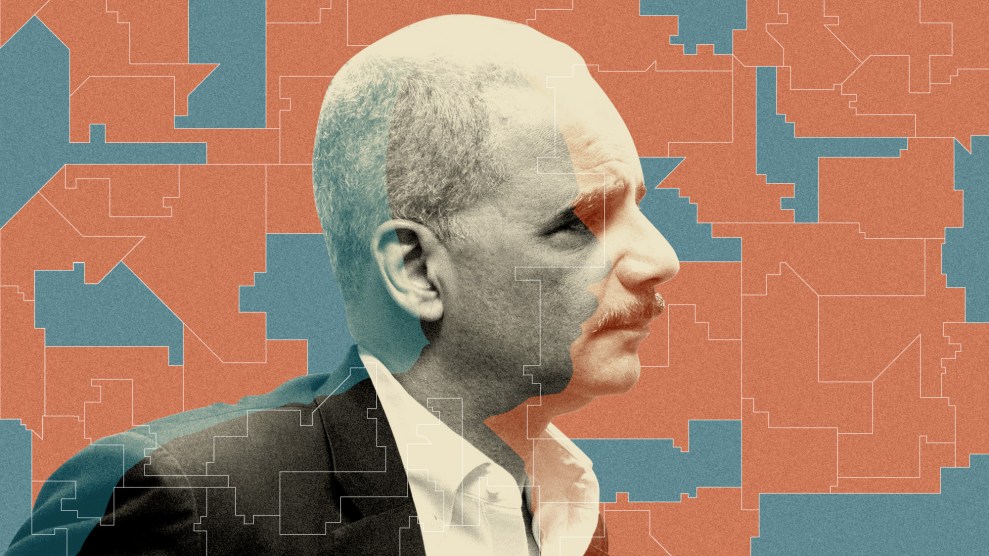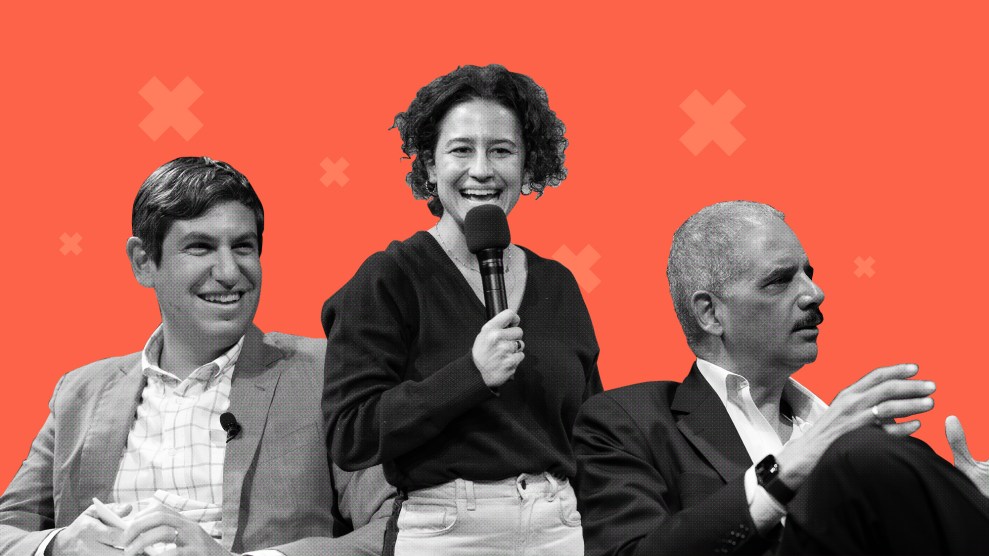
Mother Jones Illustration/Mark Helenowski
Voting is power, says Mother Jones voting rights reporter Ari Berman. But since the nation’s birth, those with actual legislative power have disenfranchised people of color, low-income Americans, and women to prevent their interests from being represented. And the stakes are only getting higher: As the 2020 presidential election approaches—and with the first votes in the Democratic primary about to be cast—voter suppression tactics remain endemic throughout our democracy.
In this week’s episode of the Mother Jones Podcast, Berman joins President Barack Obama’s attorney general Eric Holder for a wide-ranging conversation of voter suppression tactics, from draconian voter ID laws to partisan and racial gerrymandering, for a conversation moderated by Broad City star Ilana Glazer. The comedian runs a live event program called the Generator Series, during which she attempts to break down complex ideas about democracy, policy, and being a good American citizen. She describes the events as defining “minimum civic engagement.” For this shindig, co-presented by Mother Jones, Glazer invited Holder to talk about his recently launched national campaign, the National Democratic Redistricting Committee, which fights to create fair voting districts, alongside Berman, whose work illuminates the history of why we vote the way we do in the United States—and identifies flashpoints in the ongoing battle for this foundational American right.
Below is an edited, condensed version of the conversation, taped in front of a live audience at New York Public Radio’s Greene Space, in downtown Manhattan. You can also listen to the show below:
Ilana Glazer: So voter suppression 101. What is voter suppression?
Ari Berman: I think you can define it narrowly, which is voter suppression is preventing people from voting. And I think you can define it broadly and historically, which is excluding people or making it difficult for people to participate in the political process altogether. The vote has always been about power. That’s why it’s so contested, because both sides are aware of the power that it has. Those who don’t have it have clamored for it above all other rights. The civil rights movement knew that it was the most important of all rights they were going to win because that would be the one thing they could use to tangibly change people’s lives. And those who had power knew the vote was the one thing that could cause them to lose power.
In the Constitution, there is no affirmative right to vote. There are things you can’t do. You can’t theoretically prevent people of color from voting. You can’t theoretically prevent women from voting. You can’t theoretically prevent people who are over 18 from voting. But if you pass a law and you say, “Oh, I didn’t pass this law to disenfranchise African Americans or Latinos or women, but that has that effect,” that’s where things get dicey.
That’s the kind of thing we’re seeing today, where you pass a law to require ID to vote. Everyone says that doesn’t seem racist, but you dig in and realize that some groups of people lack the forms of ID more than others, and it hits certain people harder. And in fact that’s the intent of the law. But it takes a little bit of peeling back the onion to realize that that’s what’s going on.
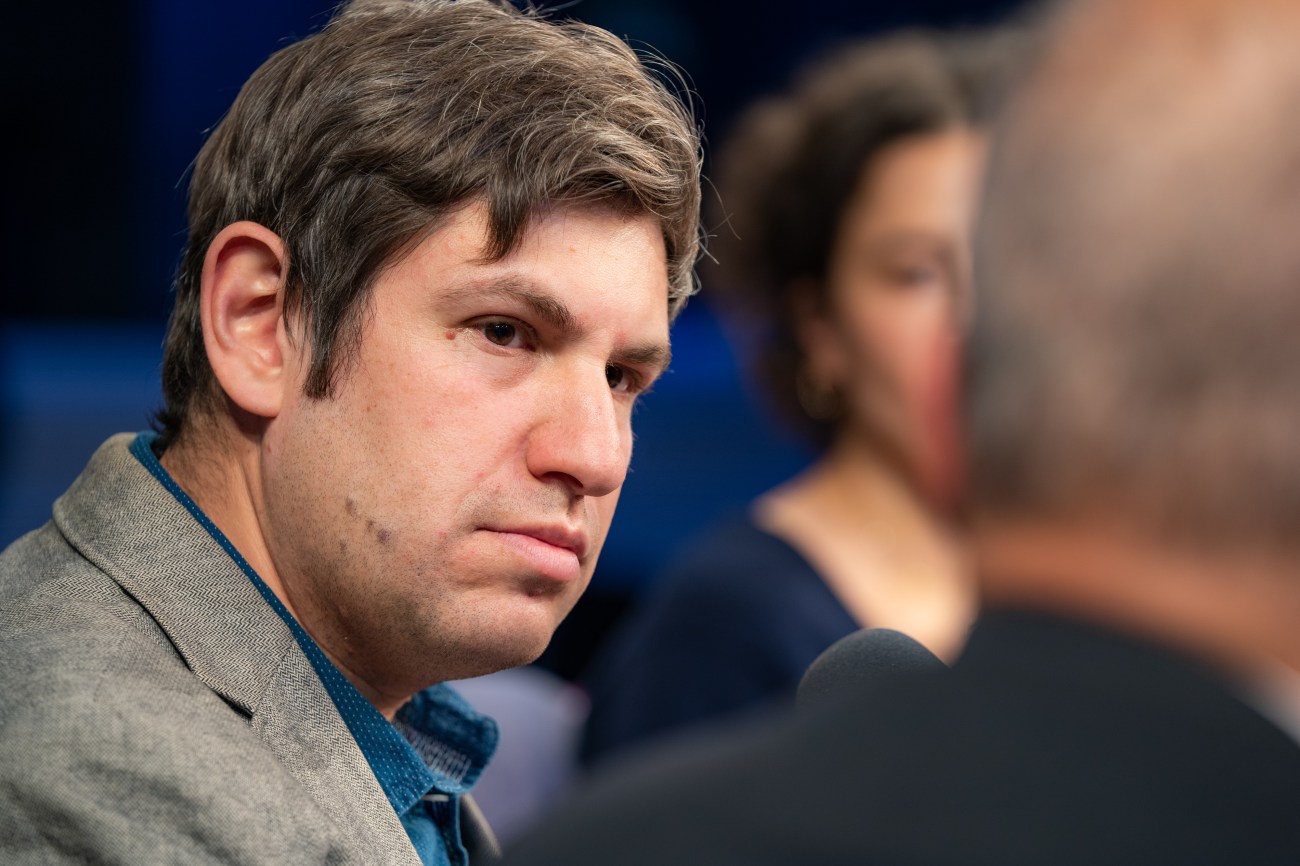
Glazer: Why not just collect the data, which is everyone’s vote, to see what would make would work for the most people?
Berman: The problem is we’re not approaching voting as forensic scientists and saying, “What can we do to get 100 percent participation?” We’re looking at some people trying to get more people to participate, but a lot of people don’t want more people to participate. We have a lot of the tools that we need to increase voter turnout. We could just automatically register everyone to vote in the same way that I am automatically enrolled in the Selective Service if there would ever be another draft. Sixteen states now have automatic registration. But I mean, you saw this as attorney general. You could do it, but people don’t want it done.
Holder: I don’t want to get partisan right off the bat, but let’s get real [laughter]. Democrats want as many people to vote as possible. We want to make it easy for people to vote, whether it’s vote by mail, whether it’s extended voting periods. Republicans—at least this iteration of the Republican Party—have made a determination that they want to restrict the number of people who get access to the polls. The Republican Party has identified itself as a party that is concerned about having too many people vote because their policies won’t attract sufficient numbers of people to win at the polls. So they’re gonna try to pick their voters instead of having voters decide who their representatives are gonna be, and that’s what I’m determined to not let happen.
Glazer: Do you think the coded, systematic, oppressive nature of these laws is starting to be exposed? Like the ’90s were so dumb! It didn’t seem like the grownups knew. Now it feels like it’s more exposed. The layers are more transparent. Do you think that’s true?
Holder: I think in some ways it’s more apparent, but as Ari pointed out, a lot of things are done. You have to have a photo ID to vote, that’s been passed in some states, and people say, “Well, what’s wrong with that? You got to show a picture ID to get on an airplane. Why shouldn’t you have a picture ID to vote?” First off, you don’t have the right to get on an airplane. You have the right to vote. There is that fundamental difference.
You have to peel it back. You say, “Everybody’s got a driver’s license.” No, everybody doesn’t have a driver’s license. And poorer folks, people of color, tend not to have driver’s licenses. So it’s not as obvious as it seems. And that is in some ways the genius and the insidiousness of these measures that have been put in place to try to maintain power for a party that I think is, in essence, a minority party when it comes to its views, but wants to retain power in spite of those minority views.
Let’s not forget, 2.8 million more Americans said we want Hillary Clinton to be president than Donald Trump. So we’ve got an Electoral College that also doesn’t necessarily disenfranchise people, but can skew things. There are any number of mechanisms in place to prevent us from being a true and pure democracy, where the people decide the direction of the country.
Berman: If we had a popular vote election, there would be no doubt that Donald Trump would lose. We would be debating how much he’s going to lose by. But now it’s: Can he win 20,000 votes in Wisconsin? Can he win 10,000 votes in Michigan? Can he win 40,000 votes in Pennsylvania? And that’s the system we’re living in. If you understand a lot of the institutional problems in our democratic system, you understand why in many ways our democracy is so screwed up today.
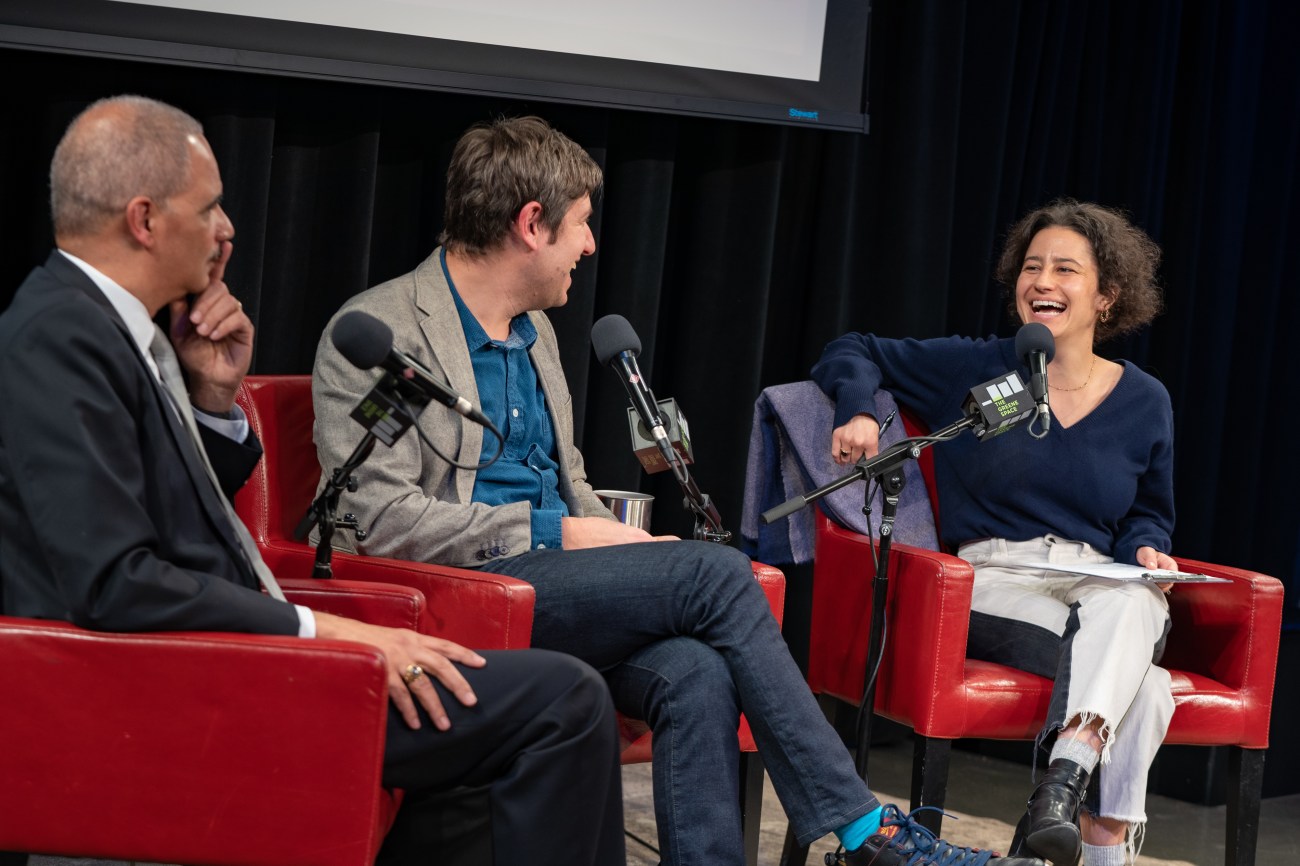
Glazer: What is the Electoral College? What and why? And is it forever?
Holder: If you look at the Federalist Papers, they talk about the Electoral College as a check on the popular vote out of concern that these people who are not maybe extremely well-off—regular people—might make a wrong decision, put a buffoon, for instance, in the White House.
The people will cast their votes. And if the thing doesn’t turn out the way it should—if somebody who is unqualified, you know, has narcissistic personality disorder, a weird hairstyle—if a person like that is selected, the electors can then come up with a way in which they will reverse the will of the people. The Electoral College didn’t really work three years ago.
Glazer: I want to talk about gerrymandering and redistricting. What is gerrymandering?
Berman: Redistricting is something that happens every 10 years that is mandated by the Constitution. We conduct a census every 10 years to figure out how many people live in the country and then we draw districts to reflect that population. So there’s nothing inherently wrong with redistricting. It’s how you do it.
Holder: You’d think that districts should generally be drawn in fair ways, have roughly the same number of people, and they do. But you can manipulate the maps in such a way so that you put maybe all the Democrats in one district and then you don’t have Democratic representation in all the other districts. And Republicans can therefore win more districts than perhaps they are entitled to. They’re drawn in all kinds of weird ways so you capture—and that’s called packing people together—or you can crack, which is to disperse a certain group in such a way that you diminish their power.
Berman: I’ll give you a really good example of what gerrymandering looks like. There is a college campus in North Carolina: North Carolina A&T. It’s a historically black university and has a lot of significance in the civil rights movement because it’s in Greensboro, North Carolina, where the sit-ins began in the 1960s.
What Republicans did is they drew a line and they cut North Carolina A&T in half, so one half of the campus is in one congressional district and the other is in another congressional district. They did this because it’s a majority-black campus where the students tend to vote Democratic. So if the students vote as one campus, they would presumably vote for a Democratic congressman. But by splitting it in two, they’re doing what Eric called cracking. They are making it so that the black population’s votes are diluted. So instead of one Democratic member, there are now two white Republican members representing that area. That’s how gerrymandering works. And that was the map that was just thrown out by state court in North Carolina for being an unconstitutional gerrymander.
Glazer: So who’s drawing the lines and who do you wish were reviewing them?
Berman: The problem is there’s an inherent conflict of interest. The state legislatures are drawing lines for themselves. This is akin to Dick Cheney leading the vice presidential search and then naming himself vice president. I don’t think the average voter much likes this, and I think you could put an anti-gerrymandering amendment on the ballot virtually anywhere and it would have a good shot of passing.
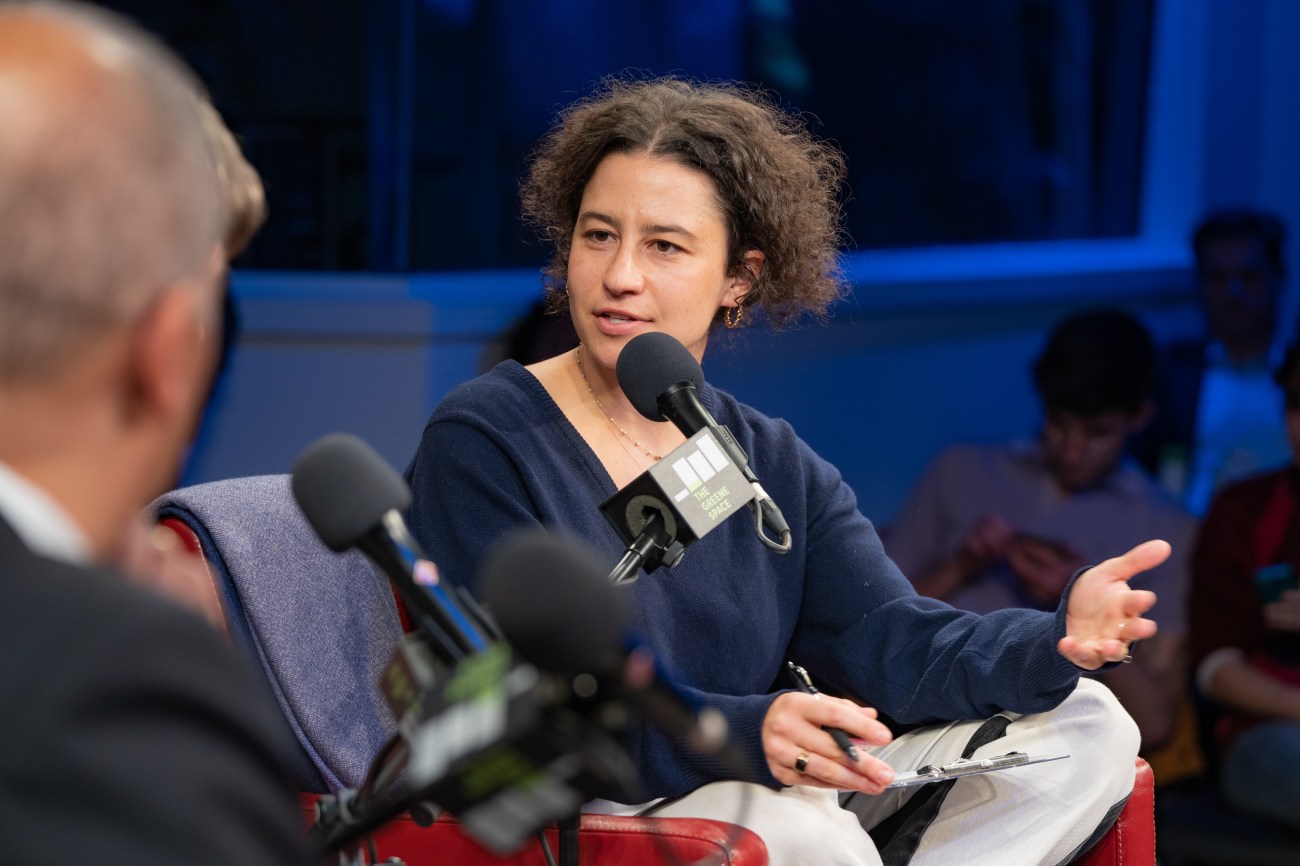
Glazer: I recently learned that the primaries for the president are different in each state.
Berman: Primaries are often designed to keep participation low. I mean, in New York, we were a poster child for this. If you wanted to vote in the Democratic primary for president in 2016 and were not a registered Democrat, you had to change your registration nine months before the primary. Who was thinking of whether they were going to be a registered Democrat nine months before the primary?
Holder: Just for the record, you’re talking about nine months? I came out of the womb as a Democrat.
Glazer: So, the NDRC. How are you changing things at that one-to-one level?
Holder: We have a multipronged strategy. We file lawsuits where we can use the state laws or the federal laws to challenge gerrymandering.
Glazer: What do you say? You’re like, “Bro, this is racist”?
Holder: Oh, yeah. Because we bring cases on the basis of racial gerrymandering. Those are the cases, for instance, that we brought in Virginia, where federal courts found that in 11 districts within Virginia, the lines were drawn on a racial basis. And the Supreme Court, including Clarence Thomas, said that is something that’s unconstitutional. The lines were redrawn and as a result of that, for the first time in like 40 years, Democrats now control both houses in the Virginia state legislature.
In 1963, two black students integrated the University of Alabama. It’s a famous scene where George Wallace stood in the schoolhouse door. Robert Kennedy, attorney general of United States, to Katzenbach, the deputy attorney general of United States, was down there in Tuscaloosa, escort these two black students into the University of Alabama. And one of those two black students was my late sister in law, Vivian Malone.
Berman: One of the most powerful scenes, I think, in my book, is when I talk about when you went to Selma, Alabama, where John Lewis nearly died marching for voting rights, and you went to Brown Chapel Church, the church where Martin Luther King and so many others spoke. You went there as the first black attorney general and you were introduced by George Wallace’s daughter, who voted for Barack Obama. That still, to this day, gives me chills.
Holder: I think it’s something you want to keep in mind, that change is possible. Just because things are not great right now, we can’t give up. I don’t want to hear people say, “I’m tired, I’m worn out.” There’s a bunch of patriots who formed this nation and took on the mightiest empire in the world and beat it. There’s a bunch of folks who got their skulls cracked, gave their lives so that we might have the opportunities that we now have. You can’t have Dr. King, John Lewis saying, “I’m tired, it’s too hard, I’m worn out.”
Dr. King said the arc of the moral universe is long, but it bends toward justice. But here’s the reality: It doesn’t bend on its own. It only bends when people like us, people like you, put the hands on that arc and pull it toward justice to get to the place where we need to be.

